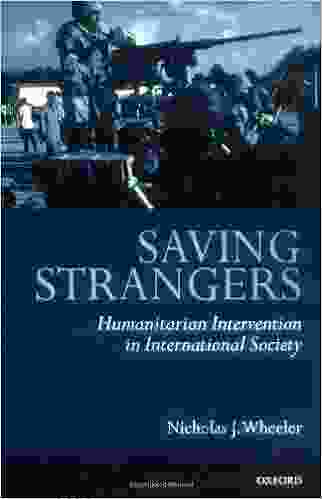Saving Strangers: Humanitarian Intervention in International Society

Humanitarian intervention is the use of military force to stop or prevent human suffering. It is a controversial issue that has been debated for centuries. Some argue that humanitarian intervention is a moral imperative, while others argue that it is illegal and counterproductive.
5 out of 5
| Language | : | English |
| File size | : | 4086 KB |
| Text-to-Speech | : | Enabled |
| Screen Reader | : | Supported |
| Word Wise | : | Enabled |
| Print length | : | 352 pages |
| Lending | : | Enabled |
In his book Saving Strangers, Michael Ignatieff argues that humanitarian intervention is justified in certain cases. Ignatieff argues that we have a moral obligation to help those who are suffering, even if they are not our own citizens. He also argues that humanitarian intervention can be an effective way to stop or prevent mass atrocities.
Ignatieff's book is a comprehensive study of the history, politics, and ethics of humanitarian intervention. The book provides a critical analysis of the arguments for and against intervention, and offers a new framework for understanding the role of humanitarian intervention in international relations.
The History of Humanitarian Intervention
The concept of humanitarian intervention has its roots in the Enlightenment. In the 18th century, philosophers such as Immanuel Kant and Jean-Jacques Rousseau argued that all human beings have certain natural rights, such as the right to life and liberty. These philosophers believed that these rights were universal and that they could be violated by any government, regardless of its legitimacy.
The idea of humanitarian intervention was first put into practice in the 19th century. In 1827, the British, French, and Russian navies intervened in the Greek War of Independence to stop the Ottoman Empire from massacring its Greek subjects. In 1860, France intervened in Syria to stop the persecution of Christians by the Druze.
Humanitarian intervention became more common in the 20th century. In 1918, the United States intervened in the Russian Civil War to help the White Army fight against the Bolsheviks. In 1945, the United States and its allies intervened in World War II to stop the Holocaust.
Since the end of the Cold War, humanitarian intervention has become even more common. In the 1990s, the United States and its allies intervened in Bosnia and Herzegovina, Kosovo, and Somalia. In 2003, the United States and its allies invaded Iraq to overthrow Saddam Hussein.
The Politics of Humanitarian Intervention
The politics of humanitarian intervention are complex and controversial. There is no easy answer to the question of when, if ever, humanitarian intervention is justified.
Some argue that humanitarian intervention is only justified when there is a clear and present danger of mass atrocities. Others argue that humanitarian intervention is justified even when the threat of mass atrocities is not imminent.
There is also disagreement about who should be responsible for carrying out humanitarian interventions. Some argue that the United Nations should be the only organization responsible for humanitarian intervention. Others argue that individual states or groups of states should be able to intervene if the United Nations is unable or unwilling to do so.
The politics of humanitarian intervention are further complicated by the fact that it is often used as a pretext for more cynical motives. For example, the United States has been accused of using humanitarian intervention to justify regime change in Iraq and Libya.
The Ethics of Humanitarian Intervention
The ethics of humanitarian intervention are also complex and controversial. There are a number of ethical arguments for and against humanitarian intervention.
One of the main arguments for humanitarian intervention is that it is a moral imperative to help those who are suffering. This argument is based on the principle of universal human rights. All human beings have certain basic rights, such as the right to life, liberty, and security. These rights are violated when people are subjected to mass atrocities. Humanitarian intervention can be seen as a way of protecting these rights and upholding human dignity.
Another argument for humanitarian intervention is that it can be an effective way to stop or prevent mass atrocities. In some cases, humanitarian intervention may be the only way to stop a government from committing genocide or other serious crimes against humanity.
There are also a number of ethical arguments against humanitarian intervention. One of the main arguments against humanitarian intervention is that it violates the principle of state sovereignty. Every state has the right to govern its own affairs without interference from other states. Humanitarian intervention can be seen as a violation of this right.
Another argument against humanitarian intervention is that it can lead to unintended consequences. For example, humanitarian intervention may lead to increased violence and instability. It may also lead to the displacement of people from their homes and the disruption of their lives.
The ethics of humanitarian intervention are complex and there is no easy answer to the question of when, if ever, humanitarian intervention is justified. However, it is important to be aware of the ethical arguments for and against humanitarian intervention so that we can make informed decisions about when it is appropriate to use military force to stop or prevent human suffering.
Saving Strangers is a comprehensive and thought-provoking study of the history, politics, and ethics of humanitarian intervention. The book provides a valuable resource for anyone who is interested in this important issue.
Ignatieff argues that humanitarian intervention is justified in certain cases. However, he also acknowledges that there are serious ethical concerns about humanitarian intervention. Ignatieff's book does not provide easy answers to the question of when, if ever, humanitarian intervention is justified. However, it does provide a valuable framework for understanding the complex issues involved in this important debate.
5 out of 5
| Language | : | English |
| File size | : | 4086 KB |
| Text-to-Speech | : | Enabled |
| Screen Reader | : | Supported |
| Word Wise | : | Enabled |
| Print length | : | 352 pages |
| Lending | : | Enabled |
Do you want to contribute by writing guest posts on this blog?
Please contact us and send us a resume of previous articles that you have written.
 Book
Book Novel
Novel Page
Page Chapter
Chapter Text
Text Story
Story Genre
Genre Reader
Reader Library
Library Paperback
Paperback E-book
E-book Magazine
Magazine Newspaper
Newspaper Paragraph
Paragraph Sentence
Sentence Bookmark
Bookmark Shelf
Shelf Glossary
Glossary Bibliography
Bibliography Foreword
Foreword Preface
Preface Synopsis
Synopsis Annotation
Annotation Footnote
Footnote Manuscript
Manuscript Scroll
Scroll Codex
Codex Tome
Tome Bestseller
Bestseller Classics
Classics Library card
Library card Narrative
Narrative Biography
Biography Autobiography
Autobiography Memoir
Memoir Reference
Reference Encyclopedia
Encyclopedia Lloyd Llewellyn Jones
Lloyd Llewellyn Jones Nicholas J Wheeler
Nicholas J Wheeler Michael Banzet
Michael Banzet M M Deluca
M M Deluca Majora Carter
Majora Carter Marc Perlin
Marc Perlin Louis Kaplan
Louis Kaplan Linda Bacon
Linda Bacon Michael Uva
Michael Uva Linda Wyszynski
Linda Wyszynski Lewis Spence
Lewis Spence Phil Cohen
Phil Cohen Marc Rikmenspoel
Marc Rikmenspoel Llewella Chapman
Llewella Chapman Linden T Harrison
Linden T Harrison Lisa Campbell Phd
Lisa Campbell Phd Majid Fotuhi
Majid Fotuhi Lois F Akner
Lois F Akner Liz Lovegood
Liz Lovegood Lydia Monin
Lydia Monin
Light bulbAdvertise smarter! Our strategic ad space ensures maximum exposure. Reserve your spot today!

 Samuel Taylor ColeridgeHow To Take Control One Obstacle At Time: Unlock Your Potential and Achieve...
Samuel Taylor ColeridgeHow To Take Control One Obstacle At Time: Unlock Your Potential and Achieve... Cole PowellFollow ·5.6k
Cole PowellFollow ·5.6k Eugene ScottFollow ·9k
Eugene ScottFollow ·9k Dennis HayesFollow ·7.8k
Dennis HayesFollow ·7.8k Isaiah PowellFollow ·9.6k
Isaiah PowellFollow ·9.6k Felix CarterFollow ·7.8k
Felix CarterFollow ·7.8k Al FosterFollow ·3.5k
Al FosterFollow ·3.5k Harold PowellFollow ·17.1k
Harold PowellFollow ·17.1k Clark BellFollow ·9.9k
Clark BellFollow ·9.9k

 J.D. Salinger
J.D. SalingerThe Montefeltro Conspiracy Renaissance Mystery Decoded
In the heart of the Italian Renaissance, a...

 Ryūnosuke Akutagawa
Ryūnosuke AkutagawaElan Vital Magazine: A Literary Sanctuary for the Mind...
In this fast-paced digital age, where...

 Derek Bell
Derek BellCode Biology: Unveiling the New Science of Life
Every living organism, from...

 Rick Nelson
Rick NelsonUnleash the Darkness: Dive into the World of Villain Arts...
Prepare to be...

 Tony Carter
Tony CarterEmbark on a Scientific Odyssey: Unveil the Secrets of...
In an era where environmental concerns...
5 out of 5
| Language | : | English |
| File size | : | 4086 KB |
| Text-to-Speech | : | Enabled |
| Screen Reader | : | Supported |
| Word Wise | : | Enabled |
| Print length | : | 352 pages |
| Lending | : | Enabled |












